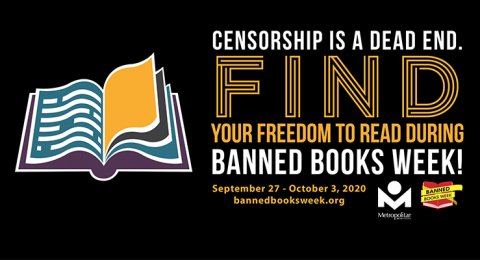
Banned Books Week 2020: Censorship is a Dead End
“Censorship is a dead end. Find your freedom to read!”
September 27-October 3 we celebrate literature that pushed the envelope, including those authors who dared to address difficult topics, share real-life experiences through story and create other-worldly realms that tested our imagination.
Can you think of a book that was so powerful you felt like it was speaking to you directly? Can you think of a book that made you look at the world in a new way? Can you think of a book that immersed you in another world so deeply that for a moment you believed the impossible was possible?
What book titles came to mind for you? Books like these are sometimes challenged because they express ideas that are considered unorthodox or unpopular by some.
Banned Books Week gives readers the opportunity to celebrate their freedom to read and the importance of free and open access to information.
Here are the Top 10 Challenged Books of 2019 put together by the American Library Association (ALA) Office for Intellectual Freedom (OIF) as reported by librarians and teachers across the country. What titles here have you read? How did they affect you?
George by Alex Gino
Reasons: challenged, banned, restricted, and hidden to avoid controversy; for LGBTQIA+ content and a transgender character; because schools and libraries should not “put books in a child’s hand that require discussion”; for sexual references; and for conflicting with a religious viewpoint and “traditional family structure”Beyond Magenta: Transgender Teens Speak Out by Susan Kuklin
Reasons: challenged for LGBTQIA+ content, for “its effect on any young people who would read it,” and for concerns that it was sexually explicit and biasedA Day in the Life of Marlon Bundo by Jill Twiss, illustrated by EG Keller
Reasons: Challenged and vandalized for LGBTQIA+ content and political viewpoints, for concerns that it is “designed to pollute the morals of its readers,” and for not including a content warningSex is a Funny Word by Cory Silverberg, illustrated by Fiona Smyth
Reasons: Challenged, banned, and relocated for LGBTQIA+ content; for discussing gender identity and sex education; and for concerns that the title and illustrations were “inappropriate”- Prince & Knight by Daniel Haack, illustrated by Stevie Lewis
Reasons: Challenged and restricted for featuring a gay marriage and LGBTQIA+ content; for being “a deliberate attempt to indoctrinate young children” with the potential to cause confusion, curiosity, and gender dysphoria; and for conflicting with a religious viewpoint I Am Jazz by Jessica Herthel and Jazz Jennings, illustrated by Shelagh McNicholas
Reasons: Challenged and relocated for LGBTQIA+ content, for a transgender character, and for confronting a topic that is “sensitive, controversial, and politically charged”The Handmaid’s Tale by Margaret Atwood
Reasons: Banned and challenged for profanity and for “vulgarity and sexual overtones”- Drama written and illustrated by Raina Telgemeier
Reasons: Challenged for LGBTQIA+ content and for concerns that it goes against “family values/morals” Harry Potter series by J. K. Rowling
Reasons: Banned and forbidden from discussion for referring to magic and witchcraft, for containing actual curses and spells, and for characters that use “nefarious means” to attain goalsAnd Tango Makes Three by Peter Parnell and Justin Richardson illustrated by Henry Cole
Reason: Challenged and relocated for LGBTQIA+ content